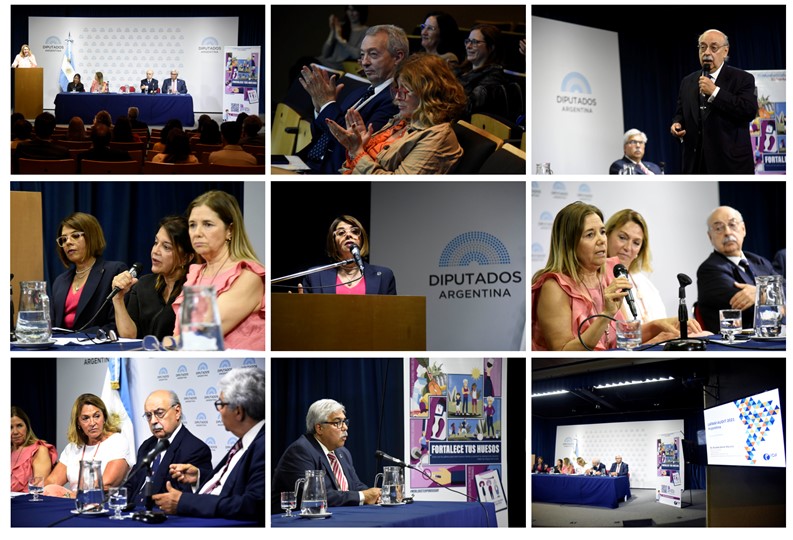LATEST NEWS
- All news
-
51Awards
-
9Burden of Osteoporosis
-
81Capture the Fracture
-
1Exercise
-
1FRAX
-
89IOF
-
36IOF Positions and Statements
-
1IOF Tour Latin America
-
23Meetings
-
78Member News
-
9Nutrition
-
39Policy
-
6Prevention
-
53Research
-
32Scientific Journals
-
14Skeletal Rare Diseases
-
9Training Courses
-
18Treatment
-
32World Osteoporosis Day
- News room - Latin America Region
Osteoporosis and fragility fractures in Argentina: present and future

On November 14th, the IOF Forum "Osteoporosis and Fragility Fractures in Argentina: present and future" was held in the auditorium of the Honourable Chamber of Deputies of the Nation. This event, the result of a collaboration between the International Osteoporosis Foundation (IOF) and the National Deputy Marcela Campagnoli, brought together various actors interested in addressing osteoporosis at the national level.
The meeting marked a milestone by putting osteoporosis on the agenda of the National Congress, serving as a starting point to advance the creation of a law that guarantees a comprehensive programme for the early detection, treatment, rehabilitation and follow-up of patients with osteoporosis.
The Forum was moderated by Lic. Mónica Caló, Regional Manager for Latin America. Among the attendees were national legislators, officials of the National Executive Branch and the National Congress, representatives of national health and patient organisations related to the issue, representatives of academia, health professionals and actors of the health system, the private sector and civil society.
National Deputy Marcela Campagnoli opened the Forum and presented her bill, which aims to be a framework for the implementation of a comprehensive programme for the early detection, treatment and rehabilitation of osteoporosis at all three levels of government. The meeting continued with the testimony of Ms. Fernanda Pagola, a patient with osteoporosis, accompanied by her family doctor Dr. Maria del Carmen Negueruela. The presentations were given by Dr. Osvaldo Messina and Dr. Felipe Geraci.
The following are the keynote speeches:
Congresswoman Marcela Campagnoli welcomed all participants to the forum and expressed her commitment to the early detection of osteoporosis. She highlighted the need to provide health centres with the necessary supplies and infrastructure. Her bill seeks to establish a programme for early detection, treatment, rehabilitation and follow-up of patients with osteoporosis. [Click here to access the full text of the Bill that creates the "Programme for the early detection of osteoporosis"].
Fernanda Pagola shared her experience as a patient, describing the transformation in her life after being diagnosed with osteoporosis. She emphasised awareness and consistency in the management of the disease, encouraging young women to request diagnostic tests such as densitometry from the age of 45.
Dr. María del Carmen Negueruela, Head of Austral University Hospital's Endocrinology Service, addressed the prejudices associated with osteoporosis and underscored the importance of the gynaecologist's involvement in referrals. He reflected on the necessary behavioural changes and the benefits of physical activity and a balanced diet as pillars for good bone health.
Dr. Osvaldo Messina, a physician specialising in internal medicine, rheumatology and osteology, and a member of the IOF Board, highlighted the challenge posed by the demographic increase in the coming years and presented the findings of the IOF LATAM AUDIT 2021 report: epidemiology, costs and impact of osteoporosis and fragility fractures in Argentina. He highlighted the usefulness of the FRAX® online tool to assess the risk of osteoporotic fracture, as an alternative method to bone densitometry.
Dr. Felipe Geraci, a doctor specialising in endocrinology and metabolism, head of the endocrinology and densitometry service at Sanatorio "Las Lomas" and coordinator of the institution's Fracture Coordination Unit (FLS) since 2016, focused on the "Main challenges and opportunities". He thanked the Congresswoman for putting osteoporosis on the agenda of the National Congress and highlighted the importance of investing in prevention. Her motivational message emphasised that, with will and access to data, it is possible to implement effective solutions to osteoporosis and prevent fragility fractures.

The Forum concluded with an open space for questions and a rich exchange of ideas between listeners, speakers and experts present. The diversity of participants, which included representatives from the public sector, academics, and researchers and representatives of civil society associations, provided a variety of enriching perspectives on osteoporosis and strategies to address it in Argentina.
In closing, crucial next steps were identified. Diseases with a high epidemiological impact such as osteoporosis require a regulatory framework to serve as a reference for health authorities at all three levels of government. These could include legislative actions linked to the proposed bill, conducting prevention campaigns to raise public awareness, implementing early detection strategies, and promoting inter-institutional and multidisciplinary collaboration to address osteoporosis more effectively in the country, so as to ensure the quality of life of the population in adulthood and the management of social and economic impacts for health systems.
